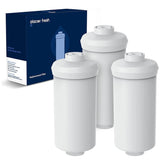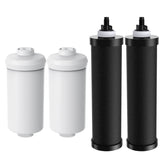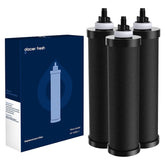











Description
xAbout the item
- NSF certified: This filter has been certified against NSF/ANSI 42
- Multistage filtration: The filter employs multi-stage filtration technology by using a pre-filter layer with coconut shell activated carbon to ensure that you and your family get pure-tasting water.
- Efficient filtration performance: Our pitcher filter cartridges are designed to reduce chlorine, taste, odor, sand, rust, mercury and suspended particles, eliminating the unpleasant color and odor from your water
- Exquisite water filter design: This filter has been precisely designed to fit the original pitcher with no worries about leakage. What’s more, the significantly easy installation saves your precious time.
-
Premium filter material: Adopts selected 100% coconut shell granular active carbon that has large surface area and micro pores to improve the water taste.
Q/A for Glacier Fresh Compostable Filters
Material and Environmental Impact
Q: How should this material be disposed of?
A: This material should ideally be composted at an industrial facility to fully leverage its biodegradable properties. The instructions will be included in the instruction manual of the packaging. If it is not composted and instead incinerated or landfilled, it will not be harmful, unlike conventional plastics.
Q: What happens to the filter after it biodegrades?
A: It breaks down into water, carbon dioxide, and biomass, leaving no harmful residue. This process is validated by ensuring earthworm survival in the compost, indicating the safety and non-toxicity of the decomposition products.
Q: Is the filter made from 100% natural substances?
A: The Activated Carbon is made of 100% renewable Sri Lankan Coconut Shells. The housing of the filter material is made of over 50% from natural, renewable resources, with the remaining part being petroleum-based. After the successful launch of the 1st generation next year we will roll out the exterior shell from 100% natural and renewable sources.
Q: Can this filter be introduced into home composting?
A: It's designed for industrial composting to ensure complete degradation. We recommend following local guidelines for disposal to maximize its environmental benefits.
Filtration Performance and Compatibility
Q: How does the filtration performance compare to traditional filters?
A: Our biodegradable filter matches the performance of traditional filters in removing impurities, ensuring users can enjoy clean water without compromising on environmental values.
Q: Which modes are available?
A: We have developed one for the Brita pitcher and 10 models of for different fridge brands. We are open to extend to other models with the support of launch partners.
Storage, Maintenance, and Certifications
Q: How should we store this material before use?
A: Store in a cool, dry place, avoiding temperatures above 70°C (158°F). Opened packages should be used promptly to maintain quality.
Q: Are there any special care or maintenance requirements for the filter?
A: No, maintenance for our biodegradable filter follows the same guidelines as traditional filters. Timely replacement and proper storage ensure sustained performance and water quality.
Q: What certifications or tests confirm the filter's eco-friendliness and safety?
A: Our filters and materials hold certifications from recognized environmental organizations, affirming their biodegradability, compostability, and safety for water filtration purposes. (TUV OK Compost, CNAS Test Report)
Q: How do you ensure the filter's effectiveness?
A: Quality and efficacy are assured through rigorous testing by third-party (NSF) authoritative organizations, ensuring our materials and filters meet strict standards for performance.
- Choosing a selection results in a full page refresh.





